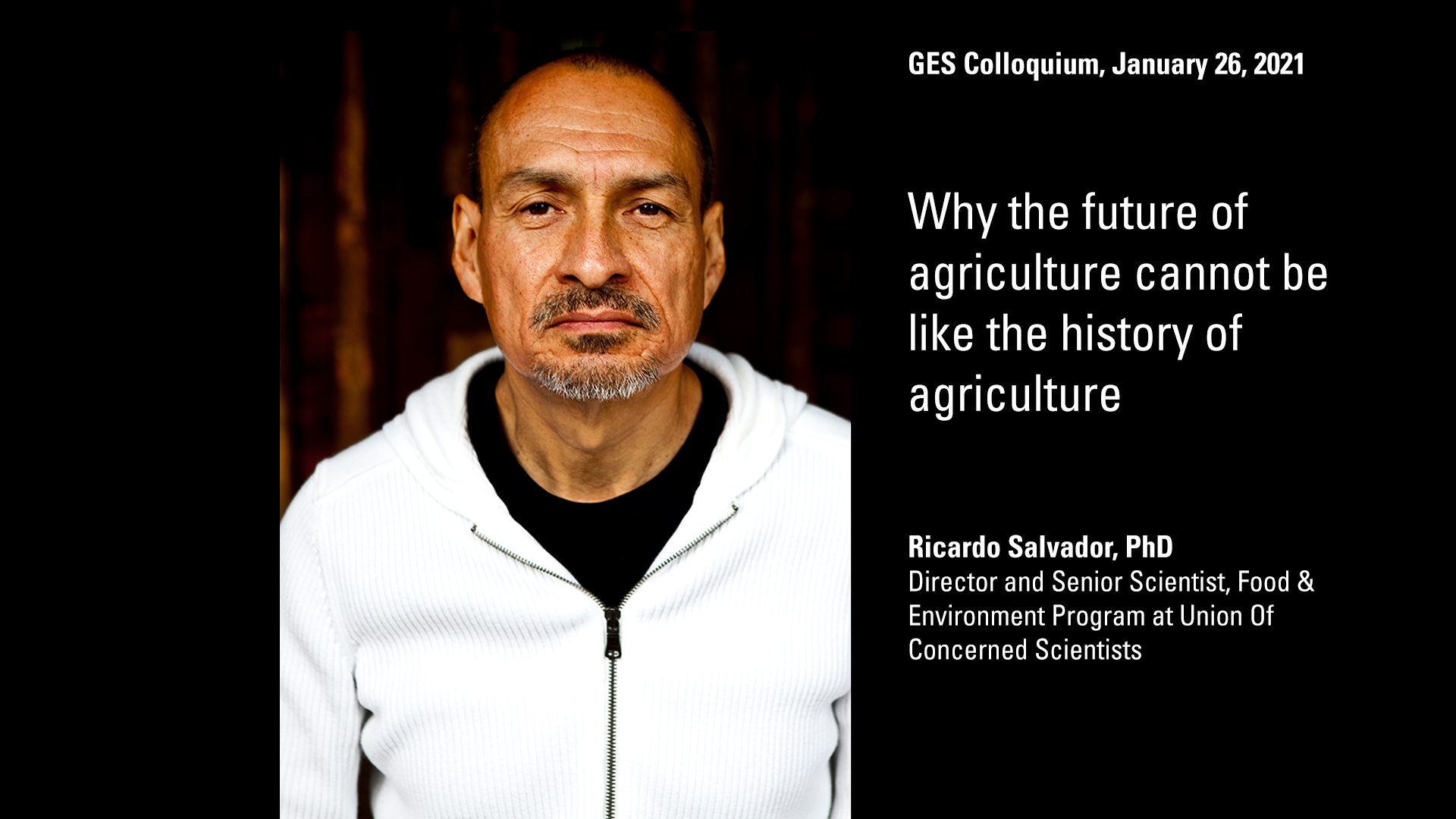
- This event has passed.
Ricardo Salvador – Why the future of agriculture cannot be like the history of agriculture | GES Colloquium (Zoom)

GES Colloquium Home | Zoom Registration | GES MediaSite | Video Archives | Podcast | @GESCenterNCSU | Newsletter
Why the future of agriculture cannot be like the history of agriculture
Speaker: Ricardo Salvador, PhD, Director and Senior Scientist, Food & Environment Program at Union Of Concerned Scientists
The existential quiz that will tell us whether humanity deserves to survive on planet Earth.
Abstract
Agriculture from its inception has been the exploitation of people and nature. “Modernity” has exacerbated that mode of operation. In the 21st century, will we be able to do better?
Related publication:
- Adam Frank, Woodruff Sullivan (2014) Sustainability and the astrobiological perspective: Framing human futures in a planetary context. Anthropocene, Volume 5, 2014, Pages 32-41, https://doi.org/10.1016/j.ancene.2014.08.002 (PDF)
- Goodbye, U.S.D.A., Hello, Department of Food and Well-Being, Ricardo Salvador, New York Times, Dec. 3, 2020 (PDF)
Speaker Bio
Dr. Ricardo J. Salvador (@cadwego) is Director and Senior Scientist of the Food & Environment Program at the Union of Concerned Scientists, in Washington DC. He leads a team of scientists, economists, policy analysts and organizers to make the case that modern, sustainable practices can be highly productive while also protecting the environment, producing healthy food, and creating economic opportunity for all. He is a member of the Board of Agriculture and National Resources of the National Academy of Sciences, and of the International Panel of Experts on Sustainable Food. He has advised a range of leading organizations in sustainable and equitable agriculture, including the Food Chain Workers Alliance, the Fair Food Program of the Coalition of Immokalee Workers, the National Sustainable Agriculture Coalition, The Land Institute, FoodCorps, National Farm to School Network, Center for Good Food Purchasing, Food System 6, and the HEAL Food Alliance.
He is an agronomist with a focus on sustainability and systems analysis. His undergraduate degree in agriculture is from New Mexico State University, and his M.S. and Ph.D. degrees in crop production and physiology are from Iowa State University. Prior to joining UCS, Ricardo worked for the Texas A&M University Extension Service, was on the Iowa State Agronomy faculty for 18 years (where with colleagues he established the first graduate program in sustainable agriculture within the Land Grant University System), and subsequently became Program Director for Food, Health and Wellbeing at the W. K. Kellogg Foundation. At the Kellogg Foundation, Ricardo partnered with colljeagues to create grant-making programs that addressed the connections between food and health, environment, economic development, sovereignty, and social justice.
WordPress database error: [Unknown column 'wp_tec_occurrences.start_date' in 'SELECT']SELECT SQL_CALC_FOUND_ROWS wp_posts.*, CAST( wp_tec_occurrences.start_date AS DATETIME ) AS event_date
FROM wp_posts LEFT JOIN wp_term_relationships ON (wp_posts.ID = wp_term_relationships.object_id) LEFT JOIN wp_postmeta ON ( wp_posts.ID = wp_postmeta.post_id AND wp_postmeta.meta_key = '_EventHideFromUpcoming' ) LEFT JOIN wp_postmeta AS mt1 ON ( wp_posts.ID = mt1.post_id )
WHERE 1=1 AND wp_posts.ID NOT IN (15852) AND (
wp_term_relationships.term_taxonomy_id IN (149,521,802)
OR
wp_term_relationships.term_taxonomy_id IN (45,47)
) AND (
wp_postmeta.post_id IS NULL
AND
( mt1.meta_key = '_EventStartDate' AND CAST(mt1.meta_value AS DATETIME) >= '2026-02-26 16:27:13' )
) AND wp_posts.post_type IN ('post', 'page', 'attachment', 'tribe_venue', 'tribe_events', 'tribe_event_series') AND ((wp_posts.post_status = 'publish'))
GROUP BY wp_tec_occurrences.occurrence_id
ORDER BY event_date ASC, wp_posts.post_date ASC
LIMIT 0, 3